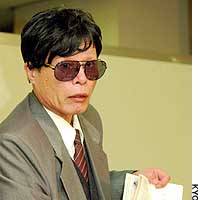The Justice Ministry turned down Tuesday a request for refugee status by a former North Korean agent, judging he does not face the threat of persecution because he already has Chinese and South Korean citizenship, ministry officials said.
The ministry thus struck down an earlier recommendation by the Tokyo Regional Immigration Bureau to recognize the man, known by the Japanese pseudonym Kenki Aoyama, as a refugee.
Aoyama told a news conference that he will file an objection with the ministry.
The U.N. convention on refugees states that people who have "well-founded fear of being persecuted for reasons of race, religion, nationality, membership of a particular social group, or political opinion" should be recognized as refugees. Japan has ratified the convention.
But in Aoyama's case, the ministry does not see any fear of him being persecuted by his country of nationality, the sources said, referring to him being a Chinese passport-holder. He also has South Korean citizenship.
The Tokyo Immigration Bureau, which applied to the ministry on behalf of Aoyama, said there is a serious danger that Aoyama would be persecuted in North Korea if he were to be deported there, in light of his revelations to the Japanese public about Pyongyang's espionage.
Last year, Aoyama told a Democratic Party of Japan project team on North Korean issues that between 70 and 80 Japanese had been abducted to North Korea, and Pyongyang leader Kim Jong Il had sanctioned all the abductions.
Aoyama is a Japan-born ethnic Korean who left for North Korea in 1960 as part of a mass repatriation program.



















With your current subscription plan you can comment on stories. However, before writing your first comment, please create a display name in the Profile section of your subscriber account page.